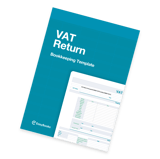Maintaining an accurate record of costs is integral for keeping track of the health of your small business’ finances. From stationery and phone bills to uniforms and staff costs, some expenses are deductible against business taxes and others are not.
Small business owners and entrepreneurs need to know the difference between expense items that are allowable against tax (i.e. deductible) and those that are not. We wrote this blog to help you understand what expenses are tax deductible for small businesses.
- What Are Tax Deductible Expenses?
- What Can I Claim as Allowable Business Expenses?
- What Are the Expenses I Can’t Claim Against My Tax?
What Are Tax Deductible Expenses?
It’s no secret businesses often have to spend a lot of money before they can start making it. For instance, if you run a construction company that requires a fleet of machinery, you’ll need to buy them, fuel them up and keep them maintained - all of which will cost you.
As your business couldn’t run without these, the money you spend on them isn’t taxable. Those costs can, therefore, be deducted from the business’s gross income before it’s subject to tax.
So if your business took £290,000 in the last year, but had £8,000 worth of tax-deductible expenses, only £282,000 would be taxed.
What Can I Claim as Allowable Business Expenses?
Many expenses are potentially tax deductible, depending on the nature of your business and its ongoing requirements.
Here are some everyday business expenses which you may claim back (as long as they fall within HMRC’s ‘wholly and exclusively’ rule.
- Office expenses (e.g. phone and broadband bills).
- Travel costs for work travel (e.g. petrol, transport fares).
- Clothing expenses for uniforms or PPE.
- Salaries and subcontractor costs.
- Stock and/or raw materials for resale.
- Financial costs such as bank or insurance charges.
- Heating and lighting your business premises.
- Rent on business premises and business rates.
- Advertising and marketing costs.
These must be exclusively for business purposes rather than personal use - although sometimes the lines are blurred. You must also accurately document expenses if you want to claim back tax on them. Best practices include using a simple way to keep track of them. We’ve gone into detail about each method in this blog here.
It’s also important to note that some employee expenses are claimable as business expenses. Your employees may incur certain personal expenses during the working day (such as buying lunch when out on a job).
Many of these expenses will qualify as allowable business expenses. So make sure your employees always keep their receipts, it ensures you can claim against those that are tax deductible.
What Are the Expenses I Can’t Claim Against My Tax?
There are some business expenses commonly thought of as tax deductible, but unfortunately aren’t. This is by no means an exhaustive list, but make sure you don’t mistakenly try to claim against the following:
- Income paid as dividends: Although salaries paid by the company are tax deductible, dividend payouts (which may form the majority of your income as owner or director) are not.
- Entertaining clients: A lot of people think this expense is tax deductible. However, the cost of wining and dining clients isn’t an allowable expense. Entertaining employees, however, is. I know this doesn’t seem to make sense, but it’s true.
- Gifts to clients: A popular belief, but wrong. Only gifts worth under £50 can count and they can’t include food, drink or anything that carries an advertisement for your business.
- Most legal fees: Generally, the only deductible legal fees are those incurred by obtaining loans, patents and registering trademarks.
- Fines: Although it would be great to write off that parking fine, incurring fines isn’t necessary when doing business, so you can’t claim them against tax.
- Donations not made via Gift Aid: Always Gift Aid your charitable contributions. Anything not qualifying for Gift Aid is unfortunately not tax-deductible.
Taking advantage of tax deductible expenses requires effective bookkeeping practices, and a good knowledge of the expenses that qualify. You can find out how to calculate expenses in this blog here but how do you go about claiming them?
How Do I Claim?
Make sure to keep accurate records of all your business expenses as proof of your costs. When you add up all your allowable expenses for the tax year, you put the total amount on your tax return.
You don’t need to send evidence of your expenses when you submit your tax return. However, you must keep proof and records so you can show them to HMRC if required.
Knowing your business can claim back some expenses is one thing, but having the right resources makes the process easier. Without them, it can be a long-winded and strenuous task, which is why your business will benefit from an expense template to help you get started.
Use Our Expense Log Template to Keep Up
To easily track your expenses then make sure to download our free expense log template today. We’ve put together useful templates that will help you better manage your business, such as profit and loss, cash flow, petty cash and more.
It’s user-friendly and completely free to download.








